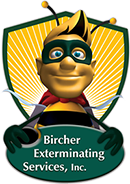While bees are crucial for plant pollination and wasps are predators that help control the insects they feed on, they can quickly become a hazard when they take residence around your property. Bees can become aggressive and will sting in order to defend themselves, their queen, colony, and nest. Wasps can even become aggressive around human food.
The most important rule of bee control is to eliminate the nest, where the queen bee is living and reproducing while her worker bees build comb and make honey to store for winter.
Bees, wasps, and hornets will build nests in or on any protected place, including overhangs, eaves, walls, garages, attics, sheds, barns, or trees. Bee honey and comb can cause structural damage when the hive or nest becomes too large, and the sweet honey will attract other pests as well, such as insects and rodents.
The best time of year for bee control is in late spring or early summer, when the queen has already established her colony but the nest is still small.
A professional bee exterminator is recommended for bee removal because bees become territorial and aggressive when their hive is threatened. Part of a bee’s job is to protect the queen by defending the hive, and even the most non-threatening bee species like honey bees and bumble bees will become aggressive when their hive is attacked for removal or extermination.




